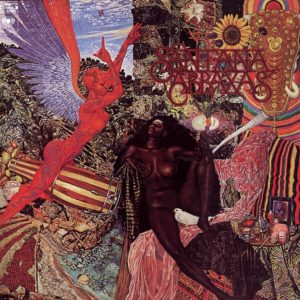I’m in the minority of human beings who consider Carlos Santana’s 1999 album Supernatural unappealing. While it sold over 30 million copies worldwide, won just about every Grammy possible, and has a lot of really good songs, there’s something about it that seems like a blatant cash grab. Even though Santana and industry mogul Clive Davis did team up to construct the album that became Supernatural, it outsold everyone’s expectations. It’s one of those sorry/not sorry scenarios. Radio’s welcoming embrace of Supernatural and its subsequent overplaying of Supernatural’s six successful singles deterred me from exploring Carlos Santana’s back catalog for decades. Abraxas, his 1970 album, is one such album and I’m glad I’ve gotten over my issues with Santana’s music.

Released on September 23, 1970 and produced by Fred Catero and Carolos Santana, Abraxas has sold over 5 million copies. Containing remarkable versions of “Black Magic Woman” and “Oye Como Va,” originally recorded by Peter Green’s Fleetwood Mac and Tito Puente, respectively, Abraxas presents a classic sounding, accessible dive into latin-fusion rock.
Upon each listen of Abraxas, what strikes me most is Carlos Santana’s unique guitar tone. He approaches the guitar with sustain and distortion while still being smooth and melodic. Like any guitar great, one only needs to hear two or three notes to know it’s him who’s playing. Greg Rolie offers lead vocals on a handful of songs, but his presence does not detract from Santana’s, who is center stage on each track. Not one, but two percussion players compliment Michael Shrieve’s drumming—the three appear as a massive rhythm machine and give the album a distinct latin vibe.
Abraxas is a piece of the early fusion dialog that emerged in the late 1960‘s and eventually morphed into modern fusion by the 1980s. Fusion is traditionally thought of as the combination of rock and jazz. But with Santana, an unmistakable latin feel runs concurrently with rock and jazz. Latin tone, it seems, is more than just multiple percussion parts—it’s a vibe, a feel, and an instrumental philosophy. Take, for example, Miles Davis’ Bitches Brew. That album features twice the percussion players as Santana, but it sounds more like music from 50 years in the future than latin fusion.
Abraxas is a welcome addition to my record collection. It has few flaws, if any. Its title intrigues me. Purportedly taken from Hermann Hesse’s Demian, the title refers to a demon from the Gnostic tradition. Abraxas is said to be a deity or demigod who embraces both good and evil and recognizes just one force in the universe. I liked this idea so much that I wrote a short story about it. Any album that can get me to write is a good album in my book.
A
Bonus Link 1: Santana performing “Black Magic Woman” in 1970.
Bonus Link 2: My short story on the Reedsy blog – Abraxas.
